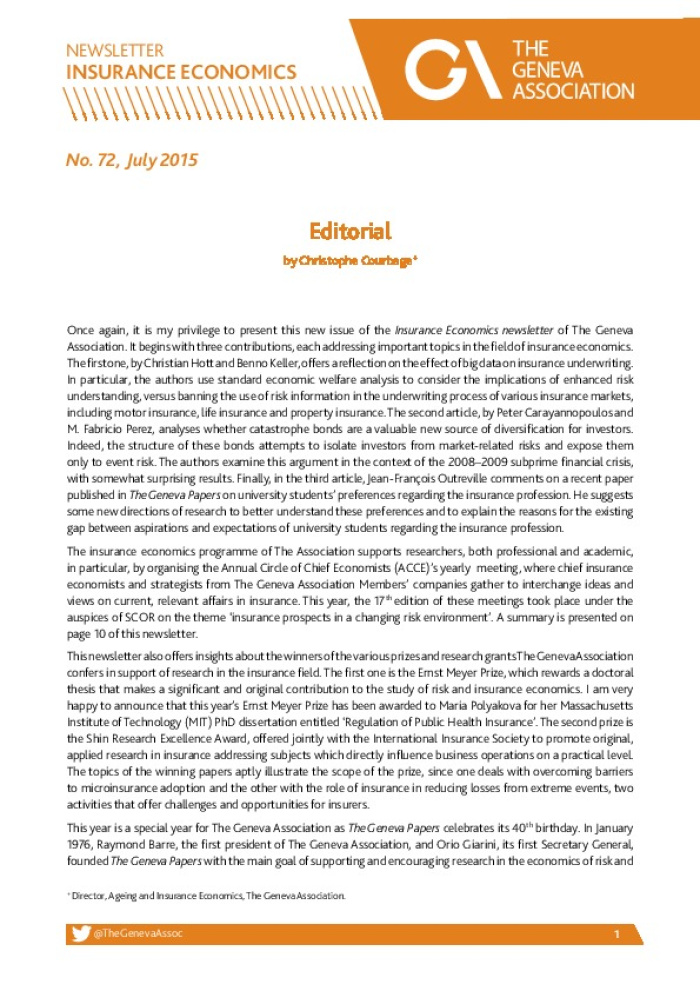Editorial of Insurance Economics Newsletter No. 72
Editorial of Insurance Economics Newsletter No. 72

1 FINANCIAL SBILITY AT ION NEWSLETTER INSURANCE ECONOMICS Editorial by Christophe Courbage+ Once again, it is my privilege to present this new issue of the Insurance Economics newsletter of The Geneva Association. It begins with three contributions, each addressing important topics in the field of insurance economics. The first one, by Christian Hott and Benno Keller, offers a reflection on the effect of big data on insurance underwriting. In particular, the authors use standard economic welfare analysis to consider the implications of enhanced risk understanding, versus banning the use of risk information in the underwriting process of various insurance markets, including motor insurance, life insurance and property insurance. The second article, by Peter Carayannopoulos and M. Fabricio Perez, analyses whether catastrophe bonds are a valuable new source of diversification for investors. Indeed, the structure of these bonds attempts to isolate investors from market-related risks and expose them only to event risk. The authors examine this argument in the context of the 2008?2009 subprime financial crisis, with somewhat surprising results. Finally, in the third article, Jean-Fran?ois Outreville comments on a recent paper published in The Geneva Papers on university students? preferences regarding the insurance profession. He suggests some new directions of research to better understand these preferences and to explain the reasons for the existing gap between aspirations and expectations of university students regarding the insurance profession. The insurance economics programme of The Association supports researchers, both professional and academic, in particular, by organising the Annual Circle of Chief Economists (ACCE)?s yearly meeting, where chief insurance economists and strategists from The Geneva Association Members? companies gather to interchange ideas and views on current, relevant affairs in insurance. This year, the 17 th edition of these meetings took place under the auspices of SCOR on the theme ?insurance prospects in a changing risk environment?. A summary is presented on page 10 of this newsletter. This newsletter also offers insights about the winners of the various prizes and research grants The Geneva Association confers in support of research in the insurance field. The first one is the Ernst Meyer Prize, which rewards a doctoral thesis that makes a significant and original contribution to the study of risk and insurance economics. I am very happy to announce that this year?s Ernst Meyer Prize has been awarded to Maria Polyakova for her Massachusetts Institute of Technology (MIT) PhD dissertation entitled ?Regulation of Public Health Insurance?. The second prize is the Shin Research Excellence Award, offered jointly with the International Insurance Society to promote original, applied research in insurance addressing subjects which directly influence business operations on a practical level. The topics of the winning papers aptly illustrate the scope of the prize, since one deals with overcoming barriers to microinsurance adoption and the other with the role of insurance in reducing losses from extreme events, two activities that offer challenges and opportunities for insurers. This year is a special year for The Geneva Association as The Geneva Papers celebrates its 40 th birthday. In January 1976, Raymond Barre, the first president of The Geneva Association, and Orio Giarini, its first Secretary General, founded The Geneva Papers with the main goal of supporting and encouraging research in the economics of risk and No. 72, July 2015 + Director, Ageing and Insurance Economics, The Geneva Association. @TheGenevaAssoc INSURANCE ECONOMICS